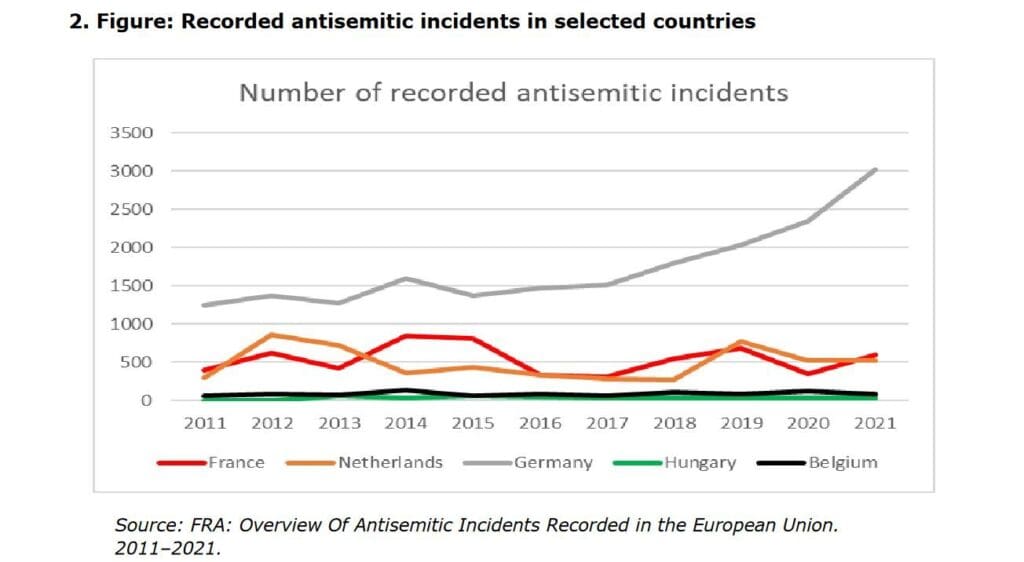A recent study titled ‘Growing Anti-Semitism in Western Europe, with a Focus on Hungary’ was conducted by Réka Zsuzsanna Máthé, a senior researcher at the Mathias Corvinus Collegium (MCC). The research found that anti-Semitic incidents are on the rise in France, Sweden, and Germany, leading to increased insecurity among Jewish citizens. At the same time, the study also revealed that anti-Semitic incidents have decreased in Hungary in recent years.
Referring to the European Union Agency for Fundamental Rights’ (FRA) 2018 survey, Máthé raised attention to the fact that hostility, threats and psychical attacks against Jewish people are most commonly reported in France, which has the largest Jewish community in Europe. However, despite having a significantly smaller Jewish population, Sweden is also considered an unsafe place for Jewish people. As opposed to that, Hungary, with a Jewish community almost three times larger than that of Sweden, records far fewer incidents—the number is between five to eight times lower when compared to the Scandinavian country. It seems therefore that the high rate of antisemitic incidents in France cannot be solely attributed to its large Jewish population.

The report also highlighted that Western European Jews have only experienced a drop in anti-Semitic incidents during COVID lockdowns. However, in 2020, after the first few waves of the pandemic, the number of incidents started to rise again with the relaxation of the regulations limiting social contact. Máthé noted that the only country with a decreasing trend is Hungary, where the highest number of incidents was recorded in 2013 with 61 reported cases and in 2020, with 30 and in 2021, with 37 incidents registered in the country.
The study also reflected on the wave of attacks that happened in France at a kosher supermarket and at Charlie Hebdo’s headquarters in 2015, in which Islamist terrorists killed 17 people, including five Jewish individuals. Máthé noted that after the tragic attacks, Israeli Prime Minister Benjamin Netanyahu encouraged French Jews to emigrate to Israel, and many did so. She added that immigration to Israel is still the highest from France because Jewish people feel unsafe in the country. Máthé pointed out that compared to the ratio of the Jewish population,
the proportion of Jews who decide to leave Hungary is the lowest of all among the countries analysed.
The Danube Institute’s research titled ‘Anti-Semitism in Hungary: Appearance and Reality’, from which a two-volume book has been published, reached the same findings as the MCC’s study: Hungary is one of the safest countries for Jewish people in Europe. Based on in-depth interviews with Hungarian Jewish representatives, the Danube Institute’s research found that while anti-Semitism still exists in Hungary, most Jewish people haven’t experienced any significant anti-Semitic incidents and can freely walk in the streets and worship in synagogues without needing heavy security measures. The situation has improved significantly since the Hungarian government introduced its zero-tolerance policy towards anti-Semitism.
The study conducted by MCC highlights another concerning trend regarding anti-Semitism in Europe. While extreme nationalism was the root cause of anti-Semitism in the past century, it seems that
the majority of anti-Semitic sentiments in Europe today come from extremist Muslims (30 per cent) and the political left (21 per cent).
Additionally, the research showed that individuals with right-wing political views have been responsible for the least number of incidents in recent times.
Anti-Semitism Intertwined with Anti-Zionism
One of the reasons why anti-Semitic sentiments are increasing on the political left is because ‘it has become fashionable on the left, and increasingly in the liberal mainstream, to demonise democratic Israel while ignoring or downplaying persecution and atrocities routinely committed by authoritarian regimes,’ as Stephen H. Norwood phrased it in his publication. Yacov Hadas-Handelsman, the Ambassador of the State of Israel in Hungary, also highlighted at a Danube Institute event that modern-day anti-Semitism often appears in different forms of anti-Zionist or anti-Israel sentiments. The Ambassador underscored in his speech that criticism of the policies or actions of the Israeli government should be separated from anti-Zionism, which denies the legitimacy of the State of Israel and the Jewish people’s right to self-determination. The Ambassador added that anti-Zionism manifests itself in movements like Boycott, Divestment, Sanctions (BDS) that aim to establish a state for the Palestinian people by destroying the State of Israel.
During the 11-day-long conflict between Israel and the Palestinian Territories in May 2021, it became evident that anti-Semitism inextricably intertwined with anti-Zionism as anti-Zionist pro-Palestine protests in New York, Portland, Germany, London, Vienna, and Toronto led to serious anti-Semitic incidents like burning Israeli flags, beating up Jewish people with Palestinian flags, attacking Jewish people with a knife, chanting ‘Rape their daughters, free Palestine’ and phrases that deny the Holocaust. Fortunately, in Hungary, there were only two Palestinian solidarity protests which attracted few people and didn’t result in any anti-Semitic rhetoric or attacks, which shows that these anti-Zionist sentiments are not yet widespread in Hungary as they are in many other Western countries.
Hungary also Boycotted the UN’s Anti-Semitic ‘Nakba’ Event
Although in 1947, the United Nation’s General Assembly adopted a resolution for the establishment of a Jewish and Arab State in the ‘British-controlled mandatory of Palestine’ and recognised the right of the Jewish people to establish their independence since the 1970s, the Arab states turned to the UN against Israel to weaken the support of the legitimacy of the Jewish state in the international community. As recalled in a previous Hungarian Conservative article in 2022, the UN has passed 15 resolutions against Israel and only 13 against the rest of the world. Similarly, in 2021, 14 resolutions were passed against Israel while only five were passed against other countries, and in 2020, 17 resolutions were passed against Israel while only six were passed against other countries. Last December, the UN also passed the pro-Palestinian resolution to commemorate the 75th year of the ‘Nakba’—meaning ‘catastrophe’ in Arabic, a term used to mourn the establishment of modern-day Israel on 14 May 1948—which was held on 15 May.
Although the Biden administration is providing major assistance to the Palestinian refugees, it boycotted the Nakba Day event at the UN alongside 45 other countries, including the United Kingdom, Canada, Australia, Albania, Ukraine, India and 11 of the European Union’s 27 member states. The fact that only 11 of the EU’s member states boycotted the event means that the majority of EU member states, including France, Spain, Sweden, Finland, Ireland, and Malta, had no objections to the anti-Israeli Nakba Day.
‘Hungary is a Beacon of Goodness in a World of Intense Hatred Towards Israel’
As the founder and director of Palestinian Media Watch, Itamar Marcus highlighted in a recent interview with Hungarian Conservative, ‘Hungary is a beacon of goodness and decency in a world of intense hatred towards the state of Israel.’ The Hungarian government not only voted against most of the anti-Israel UN resolutions in 2022 but also promised that Hungary will continue to stand up for Israel in the international community in 2023 as well and ‘will not vote for anti-Israel resolutions in the future either.’
As a recent Hungarian Conservative article reported, Hungary supported Israel in the recent terror wave that targeted Israel in which the Palestinian Islamic Jihad fired 1,469 rockets and mortar shells toward Israeli civil communities between 9 to 13 May. The Hungarian Ministry of Foreign Affairs and Trade has issued the following statement: ‘Hungary has been deeply shocked to learn that terrorists have again fired hundreds of rockets from the Gaza Strip into Israeli territory in recent days, specifically targeting civilians. We condemn all forms of terrorism in the strongest possible terms, we recognise Israel’s right to self-defence and we express our sincere sympathy to the government and people of Israel in the face of this new grave threat.’
To mark the 75th anniversary of the founding of Israel, a panel discussion was held at the CPAC Hungary conference on 4 May where Matan Peleg, CEO of the Israeli Im Tirtzu movement, stated: ‘Difficult times are a test of true friendship,
and Viktor Orbán has proven to be a true friend.’
Peleg also noted: ‘Everything that Israel does, does not satisfy the EU. The only country on the continent that is doing everything to defend Israel and its right to self-defence in the EU and the UN is Hungary.’







